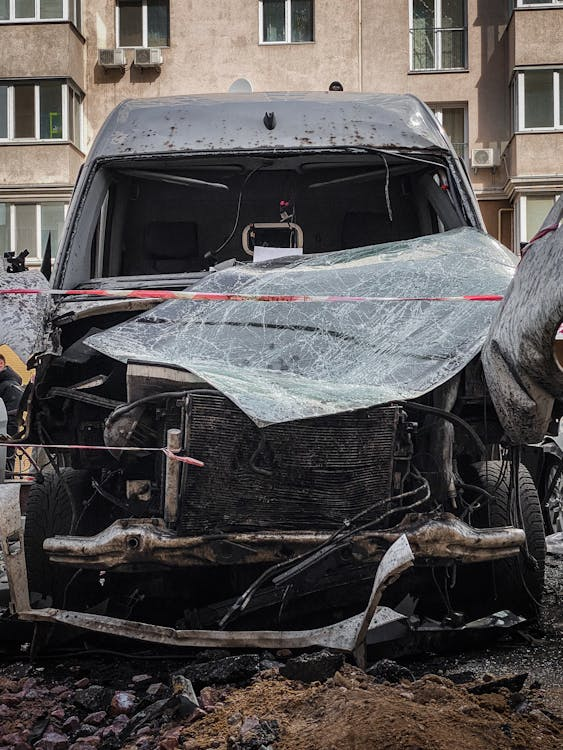[EN/PT] The Future is Today
[EN]

The future can seem frightening in many ways, whether it's the degradation of the environment, wars between nations, worsening living conditions due to the economy and corrupt governments, or the rapid evolution of technology, which can be both a blessing and a threat.
Many years ago, I watched a news report about robots that, in the future, would help or replace various professionals. There was talk of robots for domestic cleaning, robot surgeons, autonomous cars, among others.
Many of these innovations are already part of our daily lives. In regions with better infrastructure, it is more common to come across these technological innovations. In a way, the future is already the present.
For example, until recently, electric cars were something we only heard about, but rarely saw. In the city where I live, there is only one station with a charging point for these vehicles, and I only know two people who own electric cars. However, in the capital, there are many more places with charging points, which encourages the purchase of these vehicles. So much so that it's common to see BYD cars in traffic there.
But when it comes to autonomous cars, the challenge is even greater. These vehicles, which operate with a kind of autopilot, previously only appeared in movies and cartoons. Today, what we can imagine or dream about is actually becoming a reality.
For autonomous cars to navigate safely, they need to be equipped with various sensors and cameras, as well as a stable internet connection. 5G technology has been developed to facilitate this type of service, but it is not yet available in all regions.
There are different levels of automation for autonomous cars. At the lowest level, the driver still steers the vehicle manually, although limited by the speed of the road. At the highest level, the car is fully autonomous, without any human intervention.
The promise of autonomous cars is to reduce traffic accidents, which are among the biggest causes of death in the world. However, the development of this technology is also aimed at profit for companies such as Uber, which seek to increase their earnings by eliminating the need for drivers. In the end, the goal is almost always money, not the well-being of the population.

For the time being, in my city and even in my country, autonomous cars are still rare. Perhaps they exist in some university or automaker's research and development center. One of the biggest challenges is the lack of infrastructure so that these vehicles can circulate on the streets and roads.
Our roads are terrible, full of potholes and often poorly signposted. If an autonomous car in the United States had an accident, even with the excellent infrastructure there, imagine the risk of an autonomous car traveling in Brazil.
Another tricky point is liability in the event of accidents: who is to blame? The car (manufacturer) or the owner? This is a delicate issue that could lead to legal disputes. At levels of automation where humans still need to intervene, it is likely that responsibility will fall on the driver or be shared. But how do you prove who was in control at the time of the accident? And in the case of a fully autonomous car, liability would fall on the company that manufactured it.
Although all this sounds simple in theory, nobody wants to take the blame for an accident, especially when human lives are at stake. I believe that autonomous cars will only be completely safe when there is adequate infrastructure and when all vehicles are autonomous. That way, they will be able to communicate with each other, avoiding accidents such as collisions.
If you've made it this far, thank you very much for your time and if in any way this content has been useful, please leave your upvote and reblog!

[PT]

O futuro pode parecer assustador em muitos aspectos, seja pela degradação do meio ambiente, pelas guerras entre nações, pelo agravamento das condições de vida devido à economia e governos corruptos, ou pela rápida evolução da tecnologia, que pode ser tanto uma bênção quanto uma ameaça.
Há muitos anos, assisti a uma matéria em um telejornal sobre robôs que, no futuro, auxiliariam ou substituiriam diversos profissionais. Falava-se de robôs para limpeza doméstica, robôs cirurgiões, carros autônomos, entre outros.
Muitas dessas inovações já fazem parte do nosso cotidiano. Em regiões com melhor infraestrutura, é mais comum nos depararmos com essas novidades tecnológicas. O futuro, de certa forma, já é o presente.
Por exemplo, até pouco tempo, carros elétricos eram algo de que só ouvíamos falar, mas raramente víamos. Na cidade onde moro, há apenas um posto com ponto de recarga para esses veículos, e eu conheço apenas duas pessoas que possuem carros elétricos. No entanto, na capital, há muito mais locais com pontos de recarga, o que incentiva a compra desses veículos. Tanto que, por lá, já é comum ver carros da marca BYD no trânsito.
Porém, quando falamos de carros autônomos, o desafio é ainda maior. Esses veículos, que operam com uma espécie de piloto automático, antes só apareciam em filmes e desenhos animados. Hoje, o que podemos imaginar ou sonhar está, de fato, se tornando realidade.
Para que os carros autônomos naveguem com segurança, é necessário que estejam equipados com diversos sensores e câmeras, além de uma conexão estável à internet. A tecnologia 5G foi desenvolvida para facilitar esse tipo de serviço, mas ainda não está disponível em todas as regiões.
Existem diferentes níveis de automação para os carros autônomos. No nível mais baixo, o motorista ainda dirige o veículo manualmente, embora limitado pela velocidade da via. No nível mais alto, o carro é totalmente autônomo, sem qualquer intervenção humana.
A promessa dos carros autônomos é reduzir os acidentes de trânsito, que estão entre as maiores causas de morte no mundo. No entanto, o desenvolvimento dessa tecnologia também visa o lucro de empresas como a Uber, que buscam aumentar seus ganhos eliminando a necessidade de motoristas. No final, quase sempre o objetivo é o dinheiro, e não o bem-estar da população.

Por enquanto, em minha cidade e até mesmo no meu país, carros autônomos ainda são raros. Talvez existam em alguma universidade ou centro de pesquisa e desenvolvimento de montadoras. Um dos maiores desafios é a falta de infraestrutura para que esses veículos possam circular nas ruas e estradas.
Nossas estradas são péssimas, cheias de buracos e frequentemente mal sinalizadas. Se um carro autônomo nos Estados Unidos sofreu um acidente, mesmo com a excelente infraestrutura de lá, imagine o risco de um carro autônomo trafegando no Brasil.
Outro ponto complicado é a responsabilidade em caso de acidentes: de quem é a culpa? Do carro (fabricante) ou do proprietário? Essa é uma questão delicada, que pode gerar disputas judiciais. Nos níveis de automação em que o humano ainda precisa intervir, é provável que a responsabilidade recaia sobre o motorista ou seja compartilhada. Mas como provar quem estava no controle no momento do acidente? E no caso de um carro totalmente autônomo, a responsabilidade recairia sobre a empresa que o fabricou.
Embora tudo isso pareça simples na teoria, ninguém quer assumir a culpa por um acidente, especialmente quando vidas humanas estão em jogo. Acredito que os carros autônomos só serão completamente seguros quando houver infraestrutura adequada e quando todos os veículos forem autônomos. Dessa forma, eles poderão se comunicar entre si, evitando acidentes como colisões.
Se chegou até aqui muito obrigado pelo seu tempo e se de alguma forma este conteudo foi útil, deixe seu upvote e reblog!

Posted Using InLeo Alpha

Bzzt! Eu também acho que o futuro já está aqui, Elderdark! É incrível como a tecnologia e as pesquisas estão mudando a forma como vivemos. E você tem razão, é crucial que cuidemos do meio ambiente e dos homens, para que o progresso seja benéfico para todos! ZinZin! #hivebr
para falar a verdade eu tava um pouco desatualizado sobre o tema! eu vi que ha diferentes niveis de automação...e o que eles chamam de level 5 que seria total automação estamos muito longe...tem uns robo taxis acho que na China mas estão nos testes iniciais... Por examplo o Tesla e GM tão no level 2 de automação que seria somente um auto piloto com o carro acelarando, desacelerando e dando manobras com o volante, mas o condutor tem que estar atento em pegar o controle a qualquer momento. Eles estão tentando chegar ao level 3 em que o carro tomaria decisoes mas ainda com supervisão humana, uma delas seria o carro realizar ultrapassagens de veiculos que estão em velocidade mais baixa. Mas a GM ja se manifestou dizendo que por agora ta bem complicado chegar a esse nivel.
Eu tinha noção que os carros autonomos possui niveis de automação, mas não sabia que ainda estavamos nos níveis iniciais. Muito obrigado pelos esclarecimentos!
You are very right here. In a country that the citizens are into this services. If this bill is passed, such country will automatically receive a massive decline in employment. But I will also say that in my country, the probability of the citizens accepting this is very low due to lack of trust in machines (depending on the generation though).
For any technological innovation, sometimes adoption is instantaneous, depending on the location, while others are adopted slowly. Here in my country, until before the pandemic many people didn't have a bank account, with the pandemic and the government paying benefits people were forced to create their bank accounts. It worked so well that an instant payment system caught on and was adopted en masse.
The one of the bank is different from this. Yes back then, there's nothing like making transfer for minor items but when they saw that people no longer carry cash because of scarcity, they adopted.
Now regarding this issue, I don't think there is a personal benefit apart from the comfort it gives and Nigerians still don't trust machines a 100% yet
Se fosse ao contrário, quem vai ganhar dinheiro pelo carro não ter batido?
Ai sim os fabricantes iam querer levar o deles. A culpa nunca!
Jamais!
Isso é surreal!
!BBH
Quando se trata em ganhar dinheiro somos os responsáveis, quando há algum incendente não é nossa culpa!
@elderdark! @crazyphantombr likes your content! so I just sent 1 BBH to your account on behalf of @crazyphantombr. (2/5)
(html comment removed: )
)
Your post was manually curated by @CrazyPhantomBR.
Delegate your HP to the hive-br.voter account and earn Hive daily!
🔹 Follow our Curation Trail and don't miss voting! 🔹
Eles estão entre nós e tem tudo para melhorar, mas ainda vai um tempinho para que fique algo mais consistente e seguro para poder utilizar. E como você comentou no seu post, a infraestrutura impacta diretamente no funcionamento de carros autônomos, então isso é algo que tem que melhorar e muito aqui no Brasil, além do preço obviamente para que exista uma adesão em massa.
!BBH !LOL !PIZZA
lolztoken.com
She is stunning.
Credit: reddit
@elderdark, I sent you an $LOLZ on behalf of shiftrox
(4/10)
NEW: Join LOLZ's Daily Earn and Burn Contest and win $LOLZ
Aqui no Brasil essa coisas vão demora chegar, justamente pela falta de infraestrutura e porque somos um país atrasado
com certeza mano, infelizmente é isso, aqui tudo demora chegar e quando chega, vem naquele valor absurdo.
$PIZZA slices delivered:
@shiftrox(2/15) tipped @elderdark
@elderdark! @shiftrox likes your content! so I just sent 1 BBH to your account on behalf of @shiftrox. (6/20)
(html comment removed: )
)